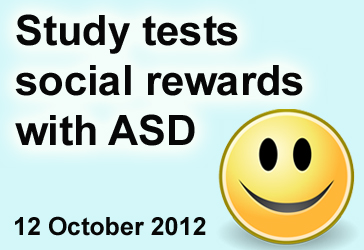Check out other stories from the Latest News
Evidence for Impaired Social Learning in Autism
By Wayne Pereanu on October 12, 2012

Background:
People learn how to behave in situations by associating their behaviors with rewards they receive when they are successful. Rewards can be external, like money or food, but can also be a pleasurable sensation produced by the brain. It is thought that humans learn to socially interact by being “rewarded” with pleasure during positive social encounters. A long-held theory suggests that ASD may be caused by impairments that reduce this pleasurable reward, leading to difficulty in acquiring social skills. It is currently unclear whether the reward processing deficiency is specifically impaired during only social situations.
What's new:
Researchers looked at the brain activity of 21 ASD patients using a technique known as fMRI. They asked ASD and control patients to perform tasks in which they could earn either monetary rewards (images of a coin) or social rewards (images of a happy face). They found that the ASD group had a significantly reduced response when given a social reward compared to the control group. However, no difference was found when monetary rewards were provided.
Why it's important:
The study provides direct evidence for a brain-based impairment in the “reward” system specific to social situations. Because social reward processing occurs in a distinct area of the brain, these results suggest potential areas of the brain where future work may focus.
Help me understand :
| Source(s) : |
| Tweet |

